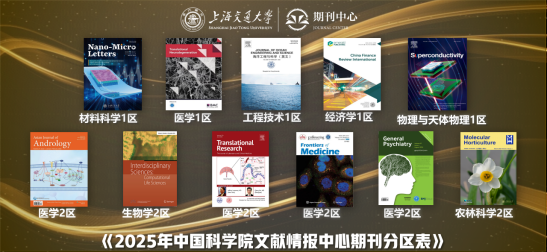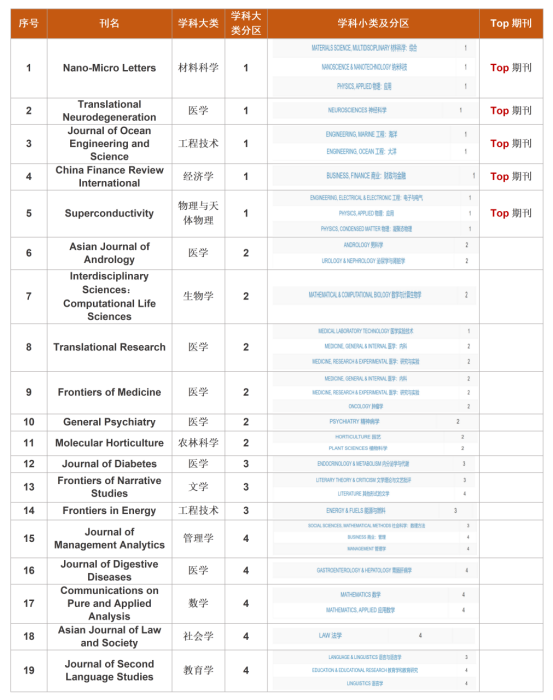On March 20, 2025, the 2025 Journal Ranking of the National Science Library (hereinafter referred to as the Journal Ranking), Chinese Academy of Sciences (CAS) was officially released. A total of 19 journals from Shanghai Jiao Tong University (SJTU) were included in this year’s rankings, covering 12 major disciplines including medicine, engineering and technology, materials science, management, education, economics, agriculture and forestry, sociology, biology, mathematics, literature, physics and astrophysics.

Among them, five journals—Nano-Micro Letters, Translational Neurodegeneration, Journal of Ocean Engineering and Science, China Finance Review International, and Superconductivity—are ranked in the first quartile (Q1) of their respective fields and designated as Top Journals, placing SJTU among the top Chinese universities in terms of journal excellence. An additional six journals—including Asian Journal of Andrology, Interdisciplinary Sciences: Computational Life Sciences, Translational Research, Frontiers of Medicine, General Psychiatry, and Molecular Horticulture—were ranked in the second quartile (Q2), placing them in the global top 20%. Two of the aforementioned journals Superconductivity and Molecular Horticulture made their debut in this year’s rankings.
Established by SJTU in 2009, Nano-Micro Letters focuses on cutting-edge research in micro/nano materials (e.g. synthesis, characterization, properties), as well as their applications in energy, catalysis, biomedicine, electromagnetic wave absorption and shielding, and many other fields. The journal is indexed in SCI, EI, PubMed, and Scopus. With a JCR impact factor of 31.6 in 2023, it ranks among the global top 100 journals and the top 3% in materials science, nanoscience and nanotechnology, and applied physics. It is included in China’s “Excellence Action Plan for Science and Technology Journals (Phase II)” and has received numerous honors, including “China's Most Internationally Influential Academic Journal” and “Outstanding Science and Technology Journal of Chinese Universities”. It has remained a consistent Q1 journal in materials science. In 2021, it was nominated for the Journal Award under the China Publishing Government Award.
Translational Neurodegeneration launched in 2014 and is the world's first open-access English journal dedicated to translational research on neurodegenerative diseases. The journal covers all subfields of neuroscience (e.g. behavior, cognition, computation, development and regeneration, neuroanatomy, neurobiology, neurochemistry, neuroendocrinology, neurogenetics, neuroimmunology, neuropathology, neuropharmacology, neurophysiology, methodology, neurotoxicology, systems neuroscience), along with relevant areas in neurology, neurosurgery, and psychiatry. With a 2023 JCR impact factor of 10.8, the journal ranks 13th among 310 neuroscience journals worldwide and has maintained its Q1 status in medicine for several years.
Founded in 2016, the Journal of Ocean Engineering and Science supports the “Double First-Class” discipline of Naval Architecture and Ocean Engineering at SJTU. The journal publishes high-impact research on ocean engineering and its applications in design and experimentation. Indexed in SCIE, Scopus, DOAJ, and Inspec, the journal has led the world in JCR impact factors for ocean engineering and naval architecture for two consecutive years. Additionally, the journal was recognized as a Top Journal in engineering and a T1 journal by the Chinese Society of Naval Architects in 2024, and has received the “Most Internationally Influential Academic Journal” award.
Since its inception in 2011, the China Finance Review International has been a key platform for scholarly work in economics and finance. The English-language journal is indexed in over 20 major international databases, including Web of Science, Scopus, and ProQuest, and recognized by ranking bodies such as ABDC, ABS, FMS, and AMI. With a JCR impact factor ranking of 3rd in business and finance in 2023, the journal has held its Q1 status in economics since entering the CAS rankings in 2023.
A new entrant to the rankings, Superconductivity is an international journal focused on promoting research in applied superconductivity. Although the journal is relatively new, it currently holds the highest impact factor among superconductivity journals worldwide and is the only Q1-ranked journal in this field. With a JCR impact factor of 5.6 in 2023, it has quickly become a central voice in global superconductivity research, exemplifying the rapid rise of high-quality Chinese academic publishing.
Established in 2021 and sponsored by SJTU, Molecular Horticulture is a journal focused on molecular regulation in horticulture, bringing attention to translational research from model plants to horticultural crops. The journal also serves as a global platform for academic exchange, bringing together scientists engaged in horticulture-related research. Indexed in 21 databases including SCIE, PubMed Central, Scopus, and DOAJ, Molecular Horticulture has achieved a JCR impact factor of 10.0 in 2023, placing it first globally in horticulture. Additionally, the journal is part of the Excellence Action Plan for Chinese Science and Technology Journals. Lastly, the journal debuted in the Q2 tier of agriculture and forestry sciences in this year’s CAS ranking, highlighting its growing international influence.
Under the strong leadership of the University Party Committee and guided by the principles found in Xi Jinping Thought, SJTU has prioritized the development of high-quality academic journals as part of its broader “Double First-Class” initiative. This direction reflects a significant enhancement in the university’s global academic reputation. As the “14th Five-Year Plan” approaches its conclusion and the “15th Five-Year Plan” begins, SJTU is committed to implementing the spirit of the Two Sessions, which aims to strengthen its journal cluster, foster scientific and technological innovation, attract global talent, and contribute to China’s strategic goal of scientific and technological self-reliance. Together, these efforts will shape a new chapter in SJTU’s role in advancing world-class academic publishing and scientific leadership.




